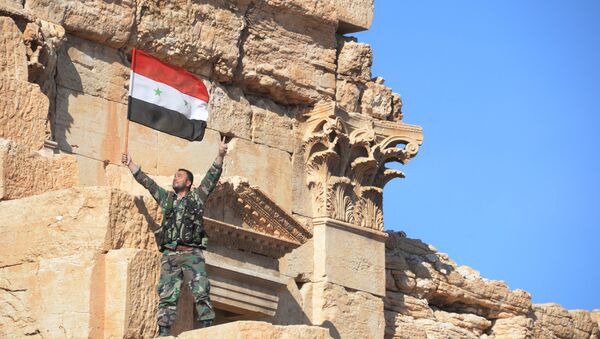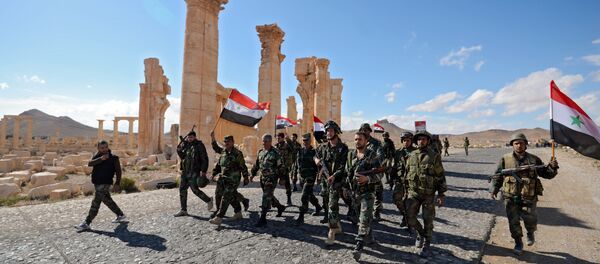"The conquest of the city by Daesh fighters in May 2015," the paper recalls, "caused a huge stir among Western public opinion, which was shocked after witnessing the dynamiting of several Greek and Roman-era ruins, as well as the beheading of the local superintendent of antiquities."
"In this way," Le Monde suggests, "the liberation of this city…is for Damascus an informational victory just as much as it is a military one. In a Europe still reeling from the shock of the Brussels attacks, the event promises to revive the debate on the need to restore dialogue with Syrian authorities."
"Calls in this direction were made on Easter weekend, when five French MPs from the Republicans Party came to the Syrian capital in solidarity with the Eastern Christians. The trip was organized by Thierry Mariani…His trip was disapproved by the French Foreign Ministry, just as the previous ones had been."
Nevertheless, Mariani and his fellow MPs have defiantly continued their visits. "Mr. Assad is not an ideal president, but he is winning the war, and we have common interests with him, as well as common enemies," the politician emphasized.
At the same time, looking to give credit where credit is due, the French paper pointed to the assistance of Russian aviation, which carried out 30-40 airstrikes a day during peak periods, and "without which the advance would not have been possible."
Moreover, Le Monde confirms, the Palmyra operation may not have been possible at all were it not for the Russian-US-sponsored Syrian ceasefire, which stepped into force late last month.
"The truce in effect since late February with the rebels has allowed Damascus and its allies to allocate significant forces from different bodies to this symbolically important operation. These include the regular Army, Hezbollah, the Iranian Revolutionary Guards, and militias, like the Desert Falcons, one of the most effective Syrian paramilitary organizations."
For his part, speaking to the French delegation over the weekend, President Bashar Assad noted that the ancient city's liberation was an "important achievement," and an illustration of the effectiveness of the military strategy presently being pursued by Syria and its allies, especially when compared to the efforts of the US-led anti-Daesh coalition.
"The effectiveness of this strategy is further highlighted especially as opposed to the US-led coalition involving more than sixty countries and its lack of seriousness in fighting terrorism, and the very little it has achieved since its establishment one-and-a-half years ago," Assad noted.
"After less than 12 months, the city of the legendary Queen Zenobia has been freed from the Daesh fanatics. After this victory, the Syrian army should, by all logic, begin advancing toward Deir Ez-Zor, a town on the Euphrates where Syrian forces are besieged by the jihadists. If the ceasefire with the rebels holds, government troops can also head in the direction of Raqqa, further to the north, which is already being approached by the Kurdish-Arabic coalition of the Syrian Democratic Forces. Thus, a race for the liberation of Daesh's Syrian stronghold may soon begin."





